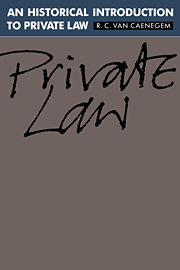Book contents
- Frontmatter
- Contents
- Preface to the English-language edition
- 1 The origins of contemporary private law, 1789–1807
- 2 Antecedents: the early Middle Ages, c. 500–c. 1100
- 3 Europe and Roman-Germanic law, c. 1100–c. 1750
- 4 Enlightenment, natural law and the modern codes: from the mid-eighteenth to the early nineteenth centuries
- 5 The nineteenth century: the interpretation of the Code civil and the struggle for the law
- 6 Statute, case law and scholarship
- 7 Factors
- General bibliography
- Index
5 - The nineteenth century: the interpretation of the Code civil and the struggle for the law
Published online by Cambridge University Press: 10 December 2009
- Frontmatter
- Contents
- Preface to the English-language edition
- 1 The origins of contemporary private law, 1789–1807
- 2 Antecedents: the early Middle Ages, c. 500–c. 1100
- 3 Europe and Roman-Germanic law, c. 1100–c. 1750
- 4 Enlightenment, natural law and the modern codes: from the mid-eighteenth to the early nineteenth centuries
- 5 The nineteenth century: the interpretation of the Code civil and the struggle for the law
- 6 Statute, case law and scholarship
- 7 Factors
- General bibliography
- Index
Summary
FRANCE
74 The years from 1789 to 1804 had been troubled but also very creative: suddenly every thing – even the boldest and most improbable innovations – seemed possible. The Napoleonic codes brought this brief period to an end and inaugurated a century of stability. From a legal point of view, it was also a century of sterility. The codes now existed; they suited the mentality and the interests of the citizens, and there was no reason to question them. Judges had only to respect them and apply them strictly; authors had merely to interpret the articles of the codes faithfully. It was out of the question now for case law or scholarship to attempt to innovate or play a creative role. Law had merged with statute, the statute was the work not of professors or magistrates, who had no mandate to act in the name of the nation, but of the legislator, the sole representative of the sovereign people.
During the Revolution the universities of the ancien régime, and their law faculties in particular, had been abolished. Some years later, schools of law were founded again, and in 1808 university teaching of law recommenced, although on a very different basis. The new system provided for a single Imperial University comprising twelve faculties of law, which were of identical standing and were under the direction of a central administration. Teaching and the subjects taught were strictly supervised by five inspectors-general. In 1809 a vice-rector was actually appointed in order to oversee the dean of the Paris faculty. This system was not operated in its full rigour, but it did for long influence the French university world profoundly.
- Type
- Chapter
- Information
- An Historical Introduction to Private Law , pp. 147 - 169Publisher: Cambridge University PressPrint publication year: 1992



